Thanks to the Inflation Reduction Act, Millions Will Find Plans at Little to No Cost
Washington, D.C. — Tomorrow is the first day of the 2024 open enrollment period for the Affordable Care Act (ACA) marketplaces. Over the next several weeks, millions of Americans will visit HealthCare.gov to sign up for affordable health coverage. Thanks to the work of President Biden and Democrats in Congress, the 2023 open enrollment period was the most successful in history — with almost 16 million Americans signing up for coverage. The Inflation Reduction Act’s expansion of premium tax credits as well as the Biden administration’s historic investment in the Navigator program and other initiatives to make coverage more affordable means the ACA will offer quality, affordable health care to more Americans. Eighty percent of people can now find coverage through the Marketplace for $10 or less per month.
In response, Protect Our Care Chair Leslie Dach issued the following statement:
“Thanks to President Biden and Democrats in Congress, millions of Americans can get quality and affordable health care through the ACA at little to no cost. People should go to HealthCare.gov to see if they qualify for health plans with lower premium costs – especially those who may have lost their Medicaid coverage in recent months. The Inflation Reduction Act is helping working families across the country save an average of $2,400 on their premiums, dramatically increasing the number of insured Americans and giving them more room to pay for other necessities like food, gas, and rent. Despite repeated attempts by Republicans to repeal and undermine the ACA, including taking away protections from people with pre-existing conditions, Democrats are committed to ensuring people in America have access to quality, affordable, and equitable care.”
Background:
FACT SHEET: ACA Marketplace Open Enrollment Starts November 1, Bringing Expanded Savings for Millions of American Families
Thanks to the Biden Administration and Democrats in Congress, the Inflation Reduction Act Extended Premium Subsidies to Millions of Americans Through 2025
On November 1, the open enrollment period for the Affordable Care Act (ACA) marketplaces will begin. Americans have until January 16 to enroll in coverage for 2024, and those who sign up by December 15 will have coverage that starts on January 1. Several state-based marketplaces will allow for enrollment beyond this deadline. Thanks to the Inflation Reduction Act’s advanced premium tax credits championed by President Biden and Democrats in Congress, high-quality coverage through the ACA marketplaces is more affordable than ever, with four in five customers eligible for coverage costing $10 or less per month.
This open enrollment season is especially important for helping people maintain health coverage as states redetermine individuals’ Medicaid eligibility following the end of the pandemic-era continuous eligibility requirement. Many people who are no longer eligible for Medicaid coverage will be able to get low-cost, quality health coverage through the Health Insurance Marketplace.
The open enrollment period is crucial not only for those looking for coverage, but also for families who may already be covered. At a time of rising costs, even people who already have health coverage should go to HealthCare.gov to check if more affordable plan options are available to them.
BY THE NUMBERS: Americans Will Continue to Save Big On Health Care
- In 2023, 15.6 million people enrolled in coverage through an ACA marketplace, the highest number of Americans to ever enroll and a 38% increase (4.3 million people) since Biden took office.
- 90 percent of people with an ACA plan are saving an average of $800 per individual and $2,400 per family on health insurance premiums as a result of the ACA’s financial assistance.
- In 2023, 4.6 million more consumers are receiving tax credits to lower their out-of-pocket premium costs than in 2021, including 1.4 million middle income consumers who are newly eligible for lower premiums thanks to the Inflation Reduction Act.
- In this open enrollment, 4 in 5 consumers will be able to enroll in coverage for less than $10 per month.
How The Biden Administration And Democrats In Congress Have Reduced The Cost Of ACA Coverage
President Biden and Democrats in Congress have been laser focused on making health care more affordable for Americans. The Inflation Reduction Act lowers health care costs and expands eligibility for millions of Americans. In 2021, the American Rescue Plan expanded premium subsidy eligibility to those making over 400 percent of the federal poverty level and capped premium costs at 8.5 percent of family income across the board. The Inflation Reduction Act extends those subsidies through 2025, keeping a lifeline available for families across the country. A record 15.6 million Americans enrolled in Marketplace coverage for 2023, with 9 in 10 consumers receiving financial assistance to lower their premium costs. President Biden also finalized a fix to the “family glitch,” which allows even more families to access affordable coverage.
Capping The Amount Of Money Families Pay For Health Insurance. The Inflation Reduction Act ensures families pay no more than 8.5 percent of their income towards coverage. This helps middle income and working families, as well as older Americans who have traditionally faced excessive premiums or live in high-premium areas. Before the enhanced premium subsidies, middle income families spent an average of 15 percent of their incomes on health insurance. The subsidies are designed to benefit those who need it most, which means the higher your income, the smaller your tax credits become. A family whose health insurance premiums alone — not including deductibles — are less than 8.5 percent of their income receive no tax credits at all.
Addressing Health Care Equity By Lowering Costs For Communities of Color. The Inflation Reduction Act’s enhanced premium subsidies, as well as substantial funding increases for Marketplace education and outreach, have boosted the number of people of color who are now covered by health insurance. Communities of color are finding health plans more affordable than ever with 53 percent more Latinos, 49 percent more Black Americans, 32 percent more American Indian and Alaska Natives enrolling in Marketplace coverage. The Biden administration has invested $98.6 million in 57 experienced Navigator organizations for the 2024 Open Enrollment Period to provide enrollment assistance to consumers, with a focus on underserved communities.
Expanding Coverage For Communities Of Color. The Center on Budget Policy and Priorities estimates the increased savings continued under the Inflation Reduction Act will cause a sharp decline in the uninsured rate across every racial group, with one in three uninsured Black adults expected to gain coverage. Prior to the American Rescue Plan, more than 11 million uninsured adults were eligible for premium tax credits, with people of color making up roughly half of the group. The premium savings continued in the Inflation Reduction Act have made more than 65 percent of uninsured Black adults eligible for zero dollar premium plans and 75 percent eligible for plans less than $50 a month. For uninsured Hispanic and Latino adults, now more than 68 percent are eligible for zero dollar premium plans and nearly 80 percent can access plans for less than $50 a month. Health coverage is imperative to reducing racial disparities across the nation.
Eliminating Premiums For Low-Wage Workers. The Inflation Reduction Act ensures no American with an income at or below 150 percent of the federal poverty level buying their coverage on the Marketplace pays a premium.
Cutting Costs For Rural America. Thanks to the provisions in the Inflation Reduction Act, roughly 65 percent of rural Americans have access to zero dollar premium health coverage and more than 76 percent are able to find a plan for less than $50 a month, narrowing the coverage differences between rural and urban America.
Eliminating The Family Glitch. Up until recently, the “family glitch,” blocked families from receiving premium subsidies if someone in their household had access to affordable health care through employment, even if the whole family wasn’t covered by that insurance. The Biden administration’s new rule will more realistically determine what is considered affordable for families, allowing an additional 1 million people to be eligible for affordable health care on the marketplace and receive premium subsidies.
Republicans Want To Repeal The ACA And Hike Health Care Costs
The Biden administration’s commitment to expanding affordable health coverage stands in sharp contrast to Republicans’ record on affordable health care. After more than 50 failed attempts to repeal the law, Republicans are still committed to increasing health care costs by dismantling the ACA. A recent study found that Republican hostility toward affordable health care led 3 million fewer people to enroll in coverage between 2014 and 2019, which increased average premiums by nearly 3 percent. Repealing the ACA would increase the number of uninsured Americans from 26.6 million to 61.6 million, according to 2020 data. Americans of all ages would be impacted by coverage losses.
Attacks on the ACA continue in 2023 with Trump’s former Office of Management and Budget Chief Russ Vought’s plan to navigate debt ceiling negotiations that would have cut $2 trillion from Medicaid alone, disproportionately impacting children, people with disabilities, rural Americans, and people of color and $600 billion in cuts to the ACA, which would rip coverage from 20 million Americans and raise premiums for nearly 15 million more. In April, the Association Health Plans Act and Self Insurance Protection Act was introduced that would allow for insurers to charge more to “employers with workers that cost more to cover such as women, older people, people with chronic illnesses and pre-existing conditions and people with disabilities.” Attacks continue as Republicans just elected Mike Johnson (R-A) as Speaker of the House. Johnson has a radical health care record with his efforts to repeal the ACA, hike health care premiums, and rip away protections for people with pre-existing conditions.

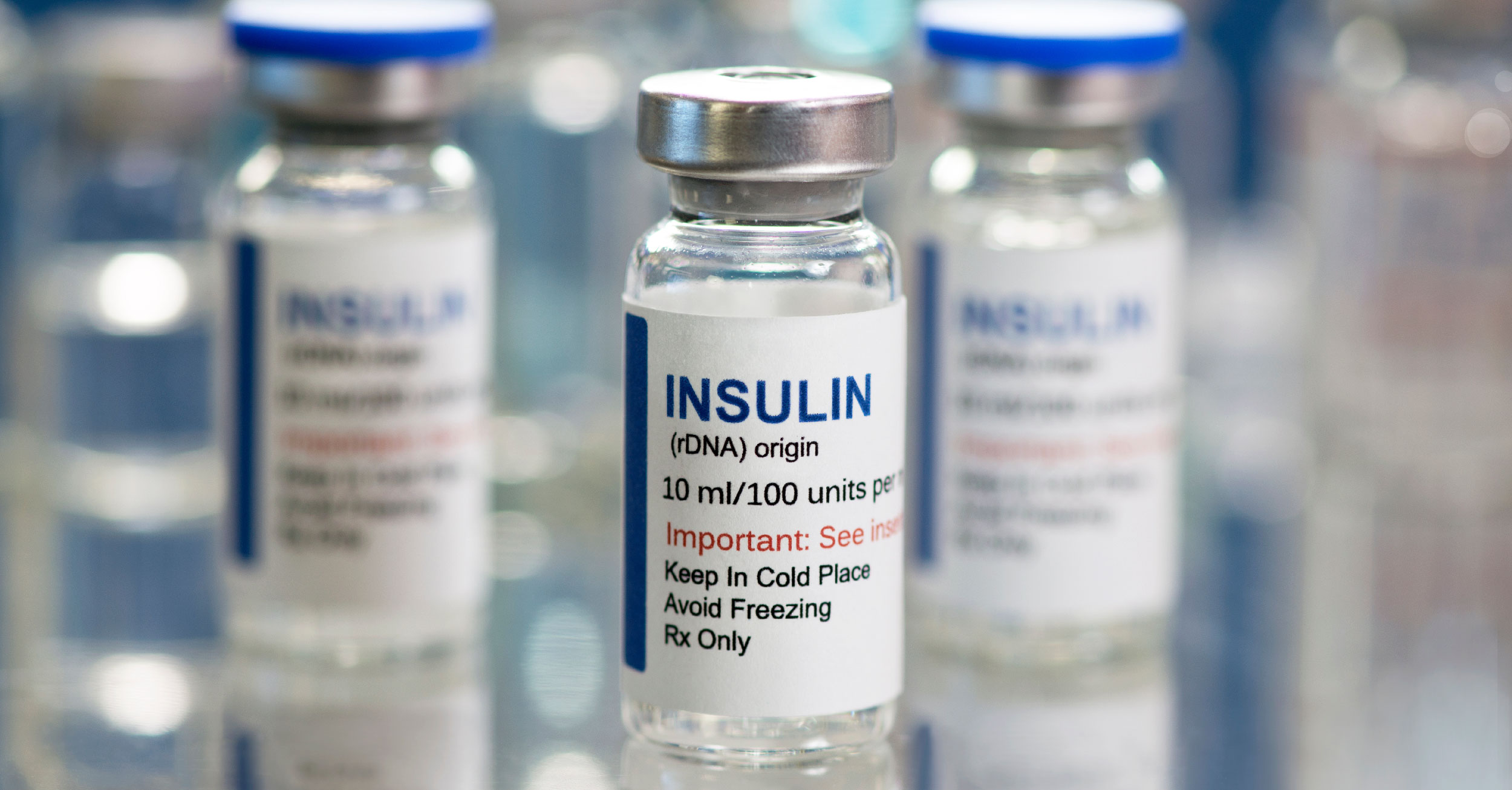
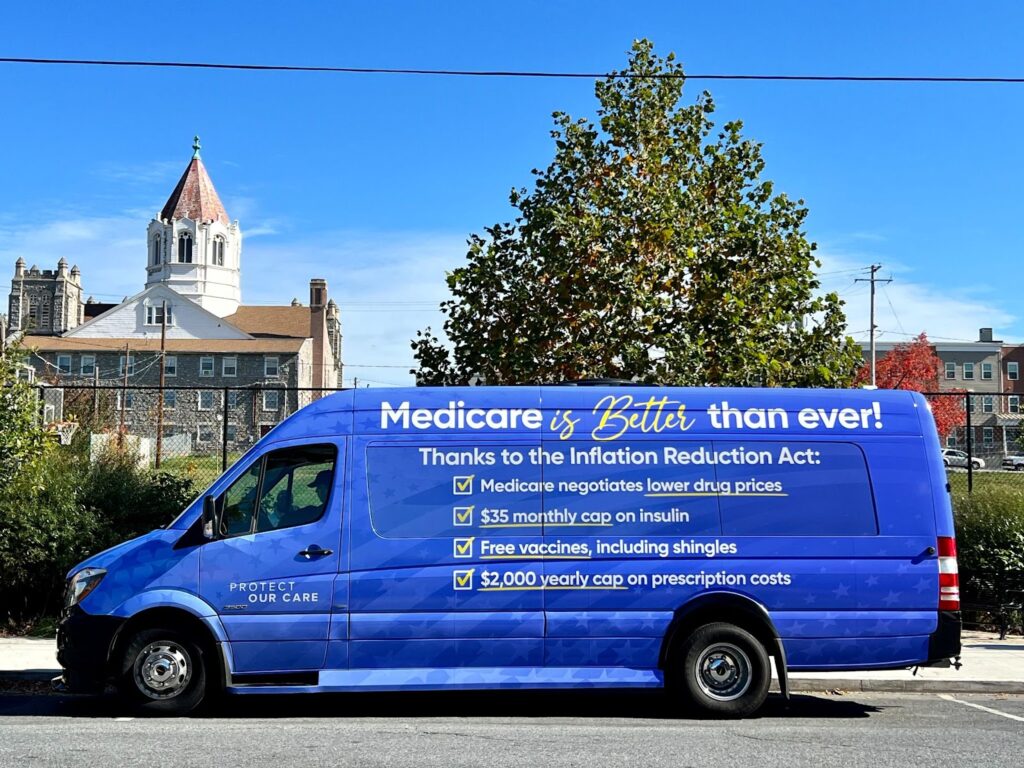 On the first week of Protect Our Care’s 7,000-mile “Medicare is Better Than Ever” tour, the
On the first week of Protect Our Care’s 7,000-mile “Medicare is Better Than Ever” tour, the  Coverage:
Coverage: Coverage:
Coverage: Coverage:
Coverage: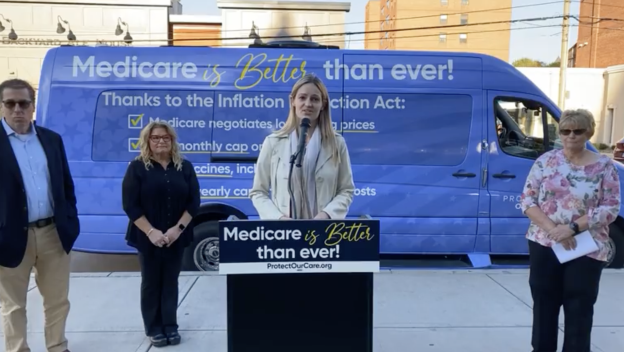 Watch the event
Watch the event 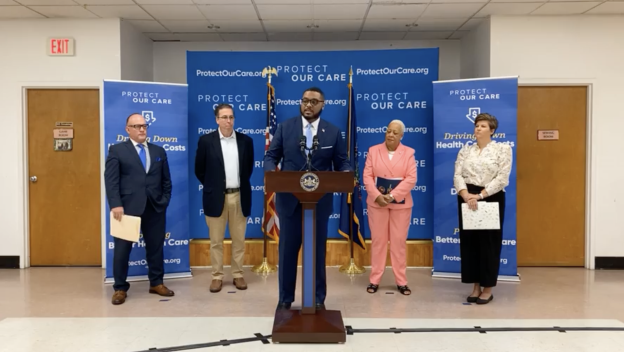 Coverage:
Coverage: Coverage:
Coverage: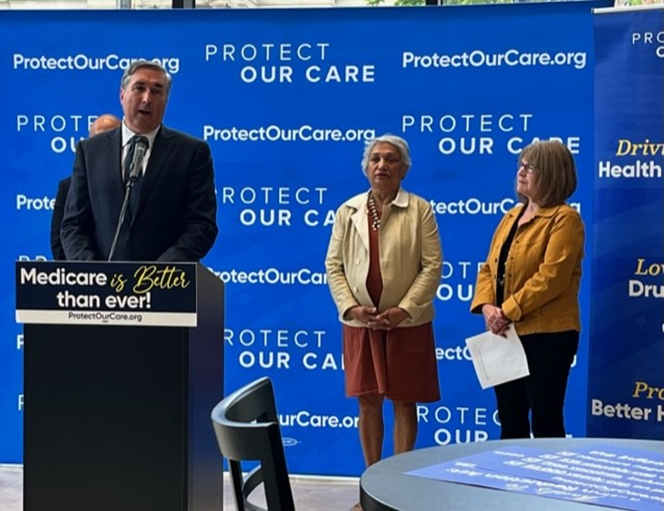 Coverage:
Coverage: Watch the event
Watch the event  Watch the event
Watch the event